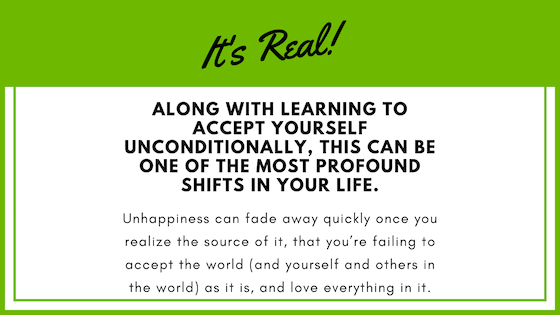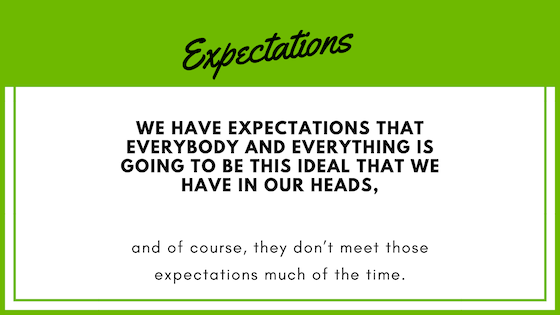This is about learning to accept ourselves unconditionally, and to realize that the amazing person we want to become is already here, already in us. We just need to uncover the awesomeness we already contain.


But a related truth is that the world around us, and everyone in it, is just as awesome. If we just accept the world for what it is, we’ll see the awesomeness it contains.
The effect of this acceptance and new view of the world are incredible:
- We become happier with the world around us, and life in general.
- We are happier with the people in our lives, and others we meet in the world.
- We don’t feel that people and the universe are against us.
- We become excited to do things in this awesome world and explore the greatness that is everywhere.
- There is no time when we are bored, discontent with life, worried that we’re missing something good happening elsewhere, because wherever we are is great and perfect.
- We are less traumatized by “bad” events, like losing a job or getting hit by a hurricane, because we accept those events as part of this great world, not bad but part of the rich fabric of life, and enjoy the variety that life offers us.
- We realize that no matter what happens, who we’re with, where we are, things are fine, great, wonderful.
That’s a huge amount of benefit for such a small change, no?

It’s real. Along with learning to accept yourself unconditionally, this can be one of the most profound shifts in your life. There will be times when you’re feeling unhappy, but that unhappiness can fade away quickly once you realize the source of it, that you’re failing to accept the world (and yourself and others in the world) as it is, and love everything in it.
Once you realize that, there is nothing you don’t love, nothing you’re afraid of. Losing something isn’t scary, because what is left is also great. You can lose your home and find another just as awesome. You can lose a friend and find another you love too. You can change jobs, cities, everything around you, and nothing is worse, only different and new.
It’s a profound change. Let’s explore how it’s possible.
How to Accept the World and Everyone in It
There are things we don’t like about our lives — a job that’s dull and dreary, a family member who antagonizes us, a home that’s less than desirable, a car that gives us headaches, people who are rude, or cause annoyances and frustrations.

These are only bad because we judge them to be so. We have expectations that everybody and everything is going to be this ideal that we have in our heads, and of course, they don’t meet those expectations much of the time. People have bad moods, and aren’t always trying to please us. The things in our lives break down, or work in ways other than what we have in our fantasies.
But what if we let go of these expectations, and just say that whatever happens, whatever we find, is OK? What if we learn to be fine with whatever we see? That doesn’t mean we don’t clean the house when it’s messy — we can be OK with the mess but enjoy the cleaning, enjoy the creating of order. It just means we aren’t antagonized when there’s a mess.
If someone else is acting a certain way, is that good or bad? It’s only bad if we wished they would act differently. So, tell yourself, “She’s acting exactly as she should, given who she is and her circumstances. She’s doing the best she can. She’s learning, as we all are.”
Well, suddenly, you can smile and have compassion for her. You can help ease her pain, or listen to her, or give her space. You can figure out how to act compassionately, and do what you need to do, without getting worked up because she’s not acting the way you wished she would.
All the world becomes OK once you decide it’s OK. When you start wishing it were different, recognize this, and let that wish go. And then say, “It’s OK as it is.”
How to See the Awesomeness of Everything

So, there’s OK, then there’s really great. Accepting everything as OK is the baseline, and it’s really all you need. Everything is OK, and that means that nothing will get you antagonized (not for long, at least).
But let’s move to the next level: there is awesomeness in everything. And everybody. Just as they are.
So, there’s a natural disaster and it causes destruction — is that awesome? Well, let’s start with the idea that it’s OK. It’s OK that it happened, because it’s useless to wish that it didn’t. It happened, and we have to accept it and move on and figure out how to fix the destruction or live with it.
But beyond OK, there’s also awesomeness:
- The natural disaster is a reminder of the incredible forces at work in this world.
- We also see the amazing people who come together, who rise up and help their neighbors in need — it brings out the noblest parts of us.
- The destruction of homes is a reminder that lives are more important than possessions and makes us appreciate the great people and the wonderful things we do have in our life.
And that’s just one example. What about everything else? It’s easy once you start looking, and start noticing:
- Your coworker who gets on your nerves — is actually really good at photography and has a great sense of humor, once you accept him as OK and get to know him.
- Your mother-in-law who criticizes you is afraid you’ll replace her, and in that fear is a beautiful human to be comforted and reassured.
- Your teenage son who seems apathetic to everything you say is actually finding a way to assert his independence, and that child becoming an adult and finding his ways is a wonderful thing, and someone perhaps in need of your gentle and understanding guidance.
- That car that breaks down is a miracle of human cooperation and inventiveness, and its breaking down is a part of the cycle of creation and destruction in life and is a way for you to practice your patience. Or perhaps to explore wonderful alternative means of transportation: walking or biking or mass transit for getting to work?
You see what I’m getting at — it’s a different way of looking at things, but once you start, you can see it everywhere. It’s awesomeness, and it’s in everything.
This post was written by Leo Babauta, originally for Zen Habits, and is republished here (in part or full) with permission.
